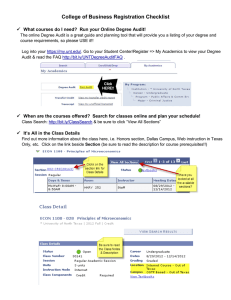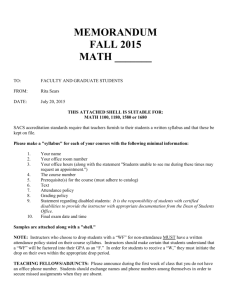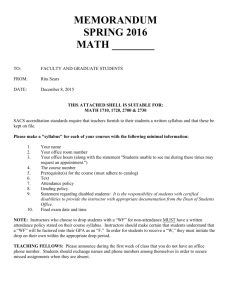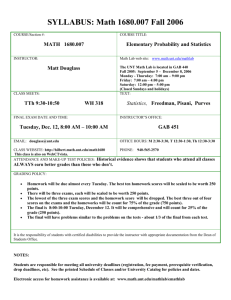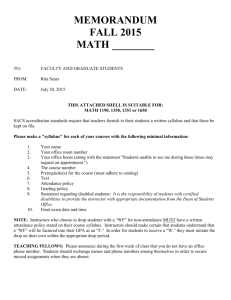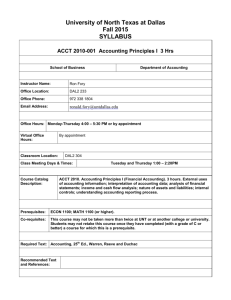BCIS 3680 SYLLABUS Spring 2016 Department of Information Technology and Decision Sciences
advertisement
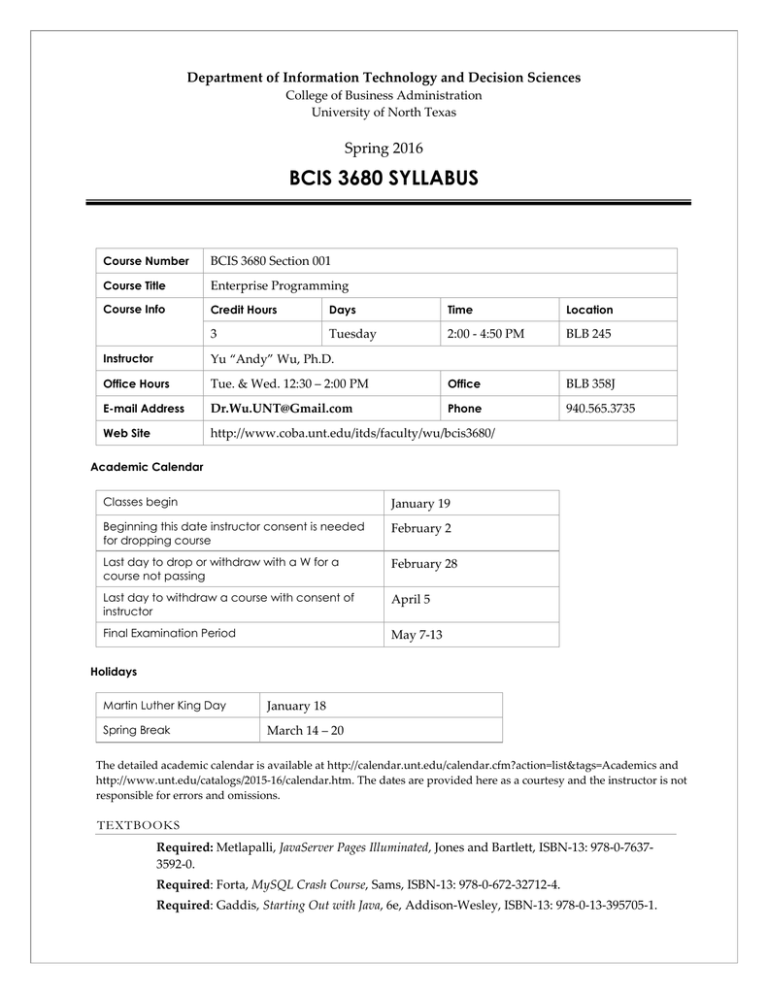
Department of Information Technology and Decision Sciences College of Business Administration University of North Texas Spring 2016 BCIS 3680 SYLLABUS Course Number BCIS 3680 Section 001 Course Title Enterprise Programming Course Info Credit Hours Days Time Location 3 Tuesday 2:00 ‐ 4:50 PM BLB 245 Instructor Yu “Andy” Wu, Ph.D. Office Hours Tue. & Wed. 12:30 – 2:00 PM Office BLB 358J E-mail Address Dr.Wu.UNT@Gmail.com Phone 940.565.3735 Web Site http://www.coba.unt.edu/itds/faculty/wu/bcis3680/ Academic Calendar Classes begin January 19 Beginning this date instructor consent is needed for dropping course February 2 Last day to drop or withdraw with a W for a course not passing February 28 Last day to withdraw a course with consent of instructor April 5 Final Examination Period May 7‐13 Holidays Martin Luther King Day January 18 Spring Break March 14 – 20 The detailed academic calendar is available at http://calendar.unt.edu/calendar.cfm?action=list&tags=Academics and http://www.unt.edu/catalogs/2015‐16/calendar.htm. The dates are provided here as a courtesy and the instructor is not responsible for errors and omissions. TEXTBOOKS Required: Metlapalli, JavaServer Pages Illuminated, Jones and Bartlett, ISBN‐13: 978‐0‐7637‐ 3592‐0. Required: Forta, MySQL Crash Course, Sams, ISBN‐13: 978‐0‐672‐32712‐4. Required: Gaddis, Starting Out with Java, 6e, Addison‐Wesley, ISBN‐13: 978‐0‐13‐395705‐1. OTHER COURSE MATERIALS Supplemental readings: In addition to the required chapters (see schedule) in the textbooks, I may add supplemental readings for some class sessions. Please check the course website frequently and acquire the materials (downloading them either directly from the site or from the provided URL) and read them before you come to the class. Some contents from the readings will be covered in the exams. PowerPoint slides: They are designed to help you understand the course content during and after my lectures; however, studying solely with the slides is not sufficient. COURSE PREREQUISITES BCIS 3630; 2.7 UNT GPA (2.7 transfer GPA if no courses taken at UNT); a grade of C or better in each previously taken BCIS course, or consent of department. If you have any concerns about these prerequisites, please stop by at the ITDS Dept. to see the ITDS advisor or send him/her an email. COURSE DESCRIPTION This course introduces you to advanced topics in Java programming, e.g., inheritance, abstract methods, Java ServerPages, database‐driven applications, etc. COURSE OBJECTIVES At the end of this course you should be able to... Program Java applications by using object‐oriented techniques, including the use of abstract classes and interfaces. Write your own custom classes and create inheritance hierarchy based on requirements for the application. Describe and use basic Web technologies including HTML, JavaScript, and CSS. Create a database; query, retrieve, and update information stored in the database by executing proper SQL statements. Connect to databases from within your Java program and perform database query and update tasks programmatically. Build Web applications using Java technologies, e.g., JSP, etc. ASSESSMENTS Exams There will be three exams during the semester. All exams are closed book, closed notes. Exams 2 and 3 are comprehensive. Exams must be taken in class at the scheduled time. It is your responsibility to make arrangements to attend exam sessions. Verifiable emergencies brought to my attention before the exam are the only exceptions to this policy. No make‐up exams will be given. Assignments Programming assignments will be assigned throughout the semester. They must be done independently. Details about assignment submission will be provided with each assignment. Quizzes There will be four unannounced quizzes throughout the semester. I will not make any arrangements for taking the quizzes early or taking a make‐up. No exceptions. BCIS 3680 Spring 2016 Page 2 Attendance Attendance will be taken four times on class days when no quiz is given (in other words, taking a quiz does not earn both quiz and attendance points). Each attendance counts as ten points. Attendance taking will not be announced in advance and may be done at the beginning of, during, or at the end of the class. Points system Each exams, quiz, and project carries maximum points that you may earn: Assessment Max. Points Exam 1 40 Exam 2 50 Exam 3 60 Assignments 170 Quizzes 40 Attendance 40 Total 400 GRADING POLICY Letter grades will be assigned as follows where the cutoff is the lowest number of cumulative points that will be assigned that grade. The cutoff points are strictly adhered to. I DON’T ROUND “BORDERLINE” POINTS TO “BUMP YOU UP” TO THE NEXT HIGHER LETTER GRADE! No “extra work” can make up for your grades at the end of the semester. However, opportunities for bonus points may be available, in the form of more challenging questions on the exams or course‐related activities I assigned in class. Grade Cutoff A 360 B 320 C 280 D 240 F Below 240 Any dispute over grades must be made in writing and within one week of the day the exam/assignment was returned to you. Your written appeal must include the original, graded assignment, and reasons for disputing the grade. Also, note that I may choose to re‐ grade the assignment in its entirety, which could result in a raising or lowering of the grade. It is far more productive studying before exams than haggling for the points afterwards. However, if you do not understand why an answer is incorrect and want to know how to improve for future exams or assignments, I am happy to discuss them with you. THE “INCOMPLETE” GRADE The I (Incomplete) grade is reserved for a very limited number of true emergencies. In addition to legitimate reasons with proper documentation, a student must be passing the BCIS 3680 Spring 2016 Page 3 course (making satisfactory progress) when the emergency occurs. For the UNT policy regarding the I grade, see http://essc.unt.edu/registrar/academic‐record‐incomplete.html. It is also the student’s responsibility to fill out the application form (http://www.coe.unt.edu/sites/ default/files/796/Incomplete_grade_Form_0.doc) and obtain approval from the instructor and the department chair. SUBMISSION OF ASSIGNMENTS Assignments are distributed through Blackboard. Go to the Blackboard assignment area for detailed instructions. No late assignments will be accepted. MAKE-UP POLICY Exams must be taken in class at the scheduled time. It is your responsibility to make arrangements to attend exam sessions. Religious reasons and verifiable medical or other emergencies brought to my attention before the exam are the only exceptions to this policy. EMAIL COMMUNICATIONS When emailing me, please address it to Dr.Wu.UNT@Gmail.com. Put the course number at the beginning of the subject line, followed by a dash, and then a brief description of the subject matter in a few words, e.g., “BCIS 3680 – JDBC Doesn’t Work”. Emails sent to my regular COBA email address could get lost in the various emails I receive daily and IT’S VERY LIKELY I WON’T REPLY TO THEM. RESPONSIBILITIES OF STUDENT You are expected to attend class regularly. If you must miss a class, it is your responsibility to cover any missed material with one of your classmates. All work completed outside of class must be typed (word processed) and use proper screen captures or non‐hand drawn diagrams. The professionalism of your work will count towards your grade. This includes spelling and grammar. Submit assignments before the due time. Hardware failure or inaccessibility is not a valid excuse for late work. This means that if the computer eats your assignment, or if the labs are full, you will not be excused from handing in an assignment on time. Missed exams receive a grade of zero. You must inform me of any special circumstances that might prevent you from completing course requirements on time. PROFESSIONALISM The College of Business Administration is a professional school and one purpose of the college is to educate future managers and corporate leaders on the types of professional behavior that is expected in corporate settings. Therefore, students will be expected to conduct themselves in a highly professional manner at all times. Specifically, students should: Be on time for class. Be respectful toward faculty, tutors, graders, and fellow students. Display tolerance toward varying viewpoints and differences in values. Violations of professionalism and any disruptiveness will be result in the reduction of one BCIS 3680 Spring 2016 Page 4 letter grade for every violation. The professor will determine such violations, but will give you one oral warning prior to reducing your grade for unprofessional behavior. Cell phones and pagers must be set to vibrate or turned off during class. Any student whose phone rings or whose pager beeps may be asked to leave for the remainder of the class. You must leave the classroom while you are answering the phone or page. ACCEPTABLE STUDENT BEHAVIOR Student behavior that interferes with an instructor’s ability to conduct a class or other studentsʹ opportunity to learn is unacceptable and disruptive and will not be tolerated in any instructional forum at UNT. Students engaging in unacceptable behavior will be directed to leave the classroom and the instructor may refer the student to the Center for Student Rights and Responsibilities to consider whether the studentʹs conduct violated the Code of Student Conduct. The universityʹs expectations for student conduct apply to all instructional forums, including university and electronic classroom, labs, discussion groups, field trips, etc. The Code of Student Conduct can be found at www.unt.edu/csrr. ACADEMIC INTEGRITY This course adheres to the UNT policy on academic integrity. The policy can be found at http://vpaa.unt.edu/academic‐integrity.htm. DISABILITY & ACCOMMODATION Any student in this class who has a documented visual or physical impairment, hearing disability, or any other disability covered by the university’s services for students with disabilities should contact me during the first week of class to discuss and arrange any instructional accommodations that may be necessary. Students who would like to serve as volunteer tutors, readers or note takers for students needing special assistance are encouraged to contact me during the first week of class. BCIS 3680 Spring 2016 Page 5 COURSE SCHEDULE Date Topic(s) Contents HW Note Intro, NetBeans 1/26 Methods Metlapalli §1.2, 1.3, 1.5, 1.6, Gaddis 5 Hands‐on Class Packages Metlapalli §1.0, 1.1, 1.8 2/2 Arrays Gaddis Ch. 7, 9; Metlapalli §1.4, 2.2 HW1 Classes Gaddis Ch. 6, Metlapalli §1.7 Classes (cont’d) JSP GUI ‐1 – HTML Metlapalli §3.1–3.4 Inheritance Gaddis §8.1‐8.4, Ch. 10 HW2 HW1 due on 2/14 & Overriding Metlapalli §2.1 Exam 1 HW2 due on 2/28 Apache Tomcat Metlapalli §4.2–4.8 HW3 Hands‐on Class JSP GUI‐2 – Forms Metlapalli §3.5, 3.6 HW3 due on 3/13 Spring Break Forms/JSP Metlapalli §6.1, 6.2 HW4 JSP (cont’d) HW4 due on 4/3 4/5 MySQL Metlapalli §7.1, 7.2, Forta Ch. 1‐4 Exam 2 Hands‐on Class 1/19 2/9 2/16 2/23 3/1 3/8 3/15 3/22 3/29 BCIS 3680 Spring 2016 Page 6 4/12 4/19 4/26 5/3 5/10 JDBC Metlapalli §7.3, 7.4, Slides HW5 Gaddis Ch. 16 (optional) DB: Retrieval, Joins Forta Ch. 5‐7, 10‐12, 15 JSP: Session Variables Metlapalli §6.3 DB: Insertion, Deletion Forta Ch. 19, 20 HW5 due on 4/29 JSP: App Variables Tutorial 3 (Friday due date) Various TBA Exam 3 NOTES 1. Number of assignments and assignment‐related dates are tentative and subject to change. 2. If a class session is marked as “Hands‐on Class”, bring your computer to class (or make an arrangement for sharing computers with your classmates) on that day. 3. The CoB tutors schedule is available at http://www.coba.unt.edu/lab/tutor.php. 4. This syllabus may be modified at the discretion of the instructor at any time. Students will be notified orally in class and/or via email. BCIS 3680 Spring 2016 Page 7
